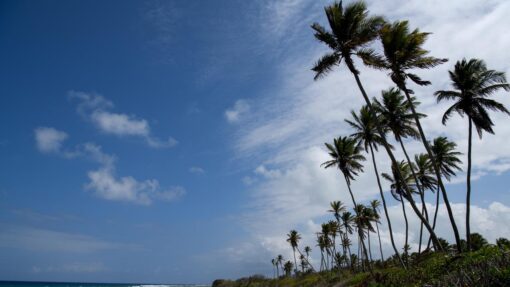Tropical storm Debby soaks northern Florida, killing 6
Maria Alejandra Cardona |

Tropical Storm Debby has drenched northern Florida and killed several people as the downgraded hurricane churned towards Georgia and the Carolinas, threatening a week of torrential downpours and flooding across the region.
The slow-moving storm ploughed into Florida’s Gulf Coast on Monday morning as a category 1 hurricane, crossing the coast near Steinhatchee about 115km southeast of Tallahassee, the National Hurricane Center said.
The storm carried hurricane-force winds of up to 130km/h when it struck in the Big Bend region – where the state’s Panhandle meets its main north-south Peninsula – but speeds ebbed as Debby pushed over land.

Trees felled in the storm killed a 12-year-old girl and a 13-year-old boy in Levy County, officials and law enforcement said.
A 19-year-old man was killed near Valdosta, Georgia, when a tree fell onto a porch, police said.
Others killed in the storm included a truck driver who lost control of an 18-wheeler on Interstate 75 and went into the Tampa Bypass Canal, and a 38-year-old woman and her 12-year-old son whose SUV crashed in Dixie County north of Tampa in stormy weather, according to law enforcement.
Roughly 150,000 customers were without power on Monday night in Florida, down from a peak of 350,000, according to Poweroutage.us, and flight trackers showed hundreds of flights originating from and heading to Florida airports were cancelled on Monday.
Vice-President Kamala Harris postponed a campaign stop scheduled this week in Savannah, Georgia, the Savannah Morning News reported.
More than 500 people were rescued from flood waters from homes and vehicles in Sarasota, Florida, on Monday, police said, and about 180 people were rescued in Manatee County, officials said.
The hurricane centre said Debby would cross Georgia and move offshore into the Atlantic Ocean by Tuesday night then re-strengthen and cross the coast again, probably in South Carolina near Charleston.

The storm was near the Florida-Georgia border late on Monday and crawling at 11km/h northeast with sustained winds of 75km/h and higher gusts.
The hurricane centre forecast “catastrophic flooding”, with some areas along the Atlantic coast to receive 20cm to 76cm of rain by Friday morning.
The governors of Georgia, South Carolina and North Carolina declared states of emergency in anticipation of Debby’s damage.
By late Monday afternoon, Debby had already dumped 20-40cm of rain in parts of central Florida, according to weather reports.
“This is going to be an event that is going to be probably here for the next five to seven days, maybe as long as 10 days, depending on how much rainfall we get,” said Kevin Guthrie, executive director of the Florida Division of Emergency Management.
Officials in Georgia and South Carolina braced for flooding.
“It may be the most water we’ve seen in a long while,” South Carolina Governor Henry McMaster said at a briefing.

“There may be flooding in areas that never flooded in the past.”
A slow-moving tropical storm as it passed over Cuba, Debby gained strength from exceptionally warm Gulf waters as it paralleled Florida’s Gulf Coast on Sunday.
Climate scientists believe man-made global warming from burning fossil fuels has raised the temperature of the oceans, making storms bigger and more devastating.
Forecasters expect numerous Atlantic hurricanes in the 2024 season, which began on June 1, including four to seven major ones.
That would exceed the record 2005 season that spawned the devastating Katrina and Rita hurricanes.
Only one other hurricane – Beryl, which was the earliest category 5 storm on record – has formed in the Atlantic in 2024.
Reuters


